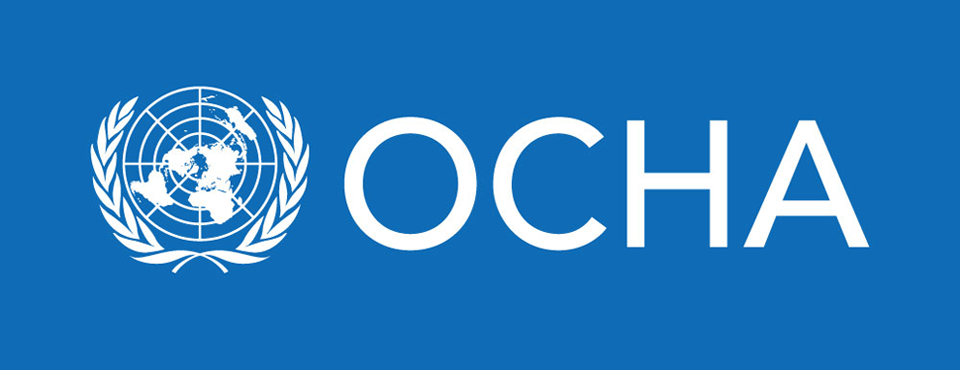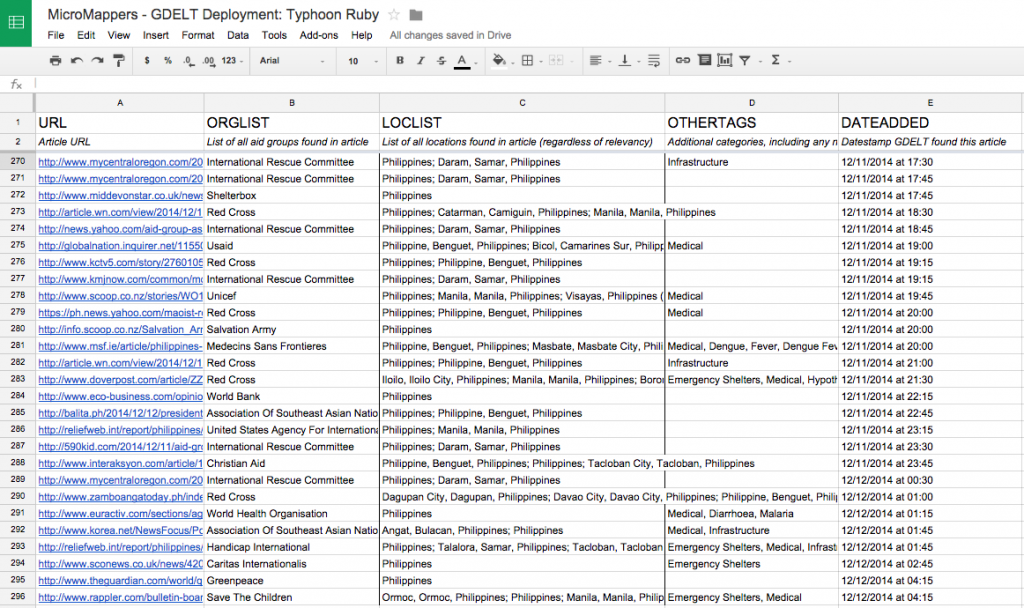
In response to Typhoon Ruby in the Philippines, GDELT collaborated with Andrej Verity of the United Nations Office for the Coordination of Humanitarian Affairs (OCHA) and Patrick Meier to provide a realtime global situational awareness system tracking worldwide reports of humanitarian aid pertaining to the typhoon. One of the challenges in the fast-moving fluid aftermath of a natural disaster is coordinating and tracking the flow of aid into the disaster area and better understanding the needs and immediate status of the affected population. Major natural disasters often generate an outpouring of aid from both large and small humanitarian organizations across the globe, making it difficult to maintain a holistic understanding of the influx of resources and personnel. In addition, aid groups on the ground in the affected area can provide a powerful informational conduit from and to the local population.
To support humanitarian efforts in the Philippines, GDELT created a live Google Sheets (Google's interactive online spreadsheet editor) spreadsheet that updated in near-realtime with all global news coverage and announcements monitored by GDELT that mentioned one of over 600 recognized humanitarian aid organizations in context with Typhoon Ruby and the Philippines. To provide near-realtime updates, a prototype of the forthcoming GDELT 2.0 system was used, which will formally debut in the next two weeks. Among its myriad new capabilities, GDELT 2.0 transitions GDELT from daily updates to now updating every 15 minutes around the clock, meaning that it could stream an updated list of all worldwide aid announcements it found every 15 minutes. Using the Google Sheets API, which supports live-updating of spreadsheets, GDELT was able to live-update the online tracking spreadsheet with each 15 minute update: the new entries literally "popped" into the spreadsheet while it was open in a browser window, ready for a team of human reviewers to dispatch, read, and annotate.
To facilitate this dashboard spreadsheet, a simple export module was created that runs every 15 minutes, reads the latest 15 minute update Global Knowledge Graph 2.0 file from GDELT 2.0, scans it for all articles containing the list of a recognized humanitarian group, the typhoon, and a location in the Philippines, and streams the resulting entries to the spreadsheet via the Google Sheets API. Additional tags were added to each entry based on selected Global Knowledge Graph themes such as infrastructure damage, medical facilities and shelters, and mentions of specific infectious diseases.
While quite simple in its current form, this prototype showcased the incredible potential of GDELT 2.0 to offer realtime global situational awareness in disaster environments or other fast-moving fluid situations, consolidating the world's conversation into a live-updating collaborative spreadsheet that can be instantly shared and interactively annotated and consumed by a large distributed team. While a Google News Alert could be used to receive live emails of selected online news coverage mentioning "typhoon AND philippines," the interest here was not to merely generate an enormous list of every article in the world that mentioned the typhoon – rather the interest was in compiling only coverage discussing humanitarian aid relating to the typhoon. Thus, here the ability to identify and extract selected key information items from coverage, ranging from recognized aid organizations to precise locations to infrastructure and medical facility-related updates and mentions of specific infectious diseases are critical to allow rapid triaging of the information environment.
The screen capture below shows what the system looked like in action. We are incredibly excited about the future potential of this system to provide realtime situational awareness for any event of interest. Imagine being able to create such a spreadsheet on-demand to collect relevant information about an emerging epidemic in a particular region, or protests breaking out in a given country, or to track mentions of poaching, cyberwarfare, or specific terror groups. The possibilities are endless and we are incredibly excited to see where people are able to take this system from here!
